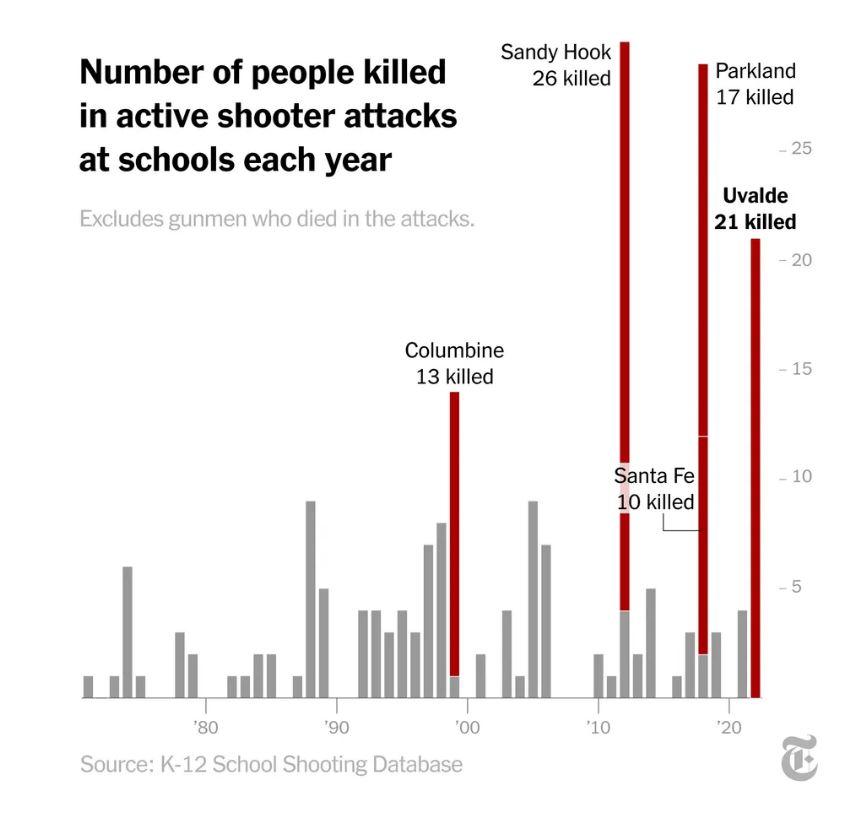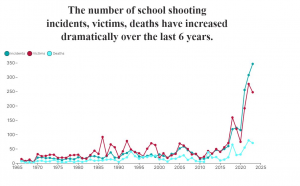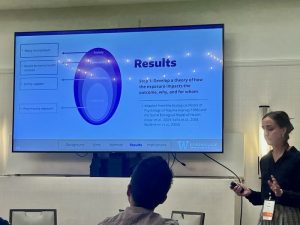
05 Aug Addressing the Aftermath: Mental Health Interventions for School Shooting Survivors
The ITHS profile series is meant to shine a deserving spotlight on individuals or programs within ITHS doing critical work across the vast spectrum of translational science. In our July installment, we are spotlighting the research of Cami Rencken, a predoctoral ITHS TL1 Trainee at the University of Washington, whose work focuses on the mental health impacts of school shootings.
Since the tragic Columbine High School shooting in 1999, over 378,000 students have faced gun violence at school, according to the Washington Post. While databases vary in their estimates, the K-12 School Shooting Database reports 348 school shootings in 2023 alone. Additionally, Everytown Research indicates that from 2013, there have been at least 1,290 incidents of gunfire on school grounds, resulting in 423 deaths and 906 injuries. It is also important to recognize that school shootings, while devastating, represent only a small fraction of the firearm violence impacting youth in the US. However, according to Everytown Research, this issue disproportionately affects children of color, with two out of every three incidents of gunfire on school grounds between 2013-2021 occurring in schools where the majority of students are from marginalized communities. Rencken’s research aims to understand and mitigate the psychological effects these traumatic events impose on individuals and communities.
Hi Cami, thanks for speaking to us today.
Cami: I’m glad to talk to you, thank you for having me.
First, can you share a little bit about your educational background?
Cami: I completed my undergraduate degree at the University of California, Davis, where I majored in global disease biology. Following that, I pursued a Master of Science in global public health at Brown University. I gained work experience in Boston before starting my PhD in epidemiology at the University of Washington, where I’m currently a third-year PhD candidate.
How did you initially connect with ITHS?
Cami: I was introduced to the ITHS by my advisor and by my colleagues at the University of Washington, Dr. Ali Rowhani-Rahbar, Kelsey Conrick, and Vivian Lyons who are also former TL1 trainees. They recognized the alignment of my research interests with ITHS’ resources and support. They recommended applying for the TL1 program, which has since been instrumental in advancing my research. The TL1 program has been invaluable, offering a comprehensive support system that includes funding, mentorship, and specialized training. This support has allowed me to dedicate more time to my research, refine my skills in data collection, analysis, and dissemination, and collaborate with experts from various disciplines. The mentorship provided has been especially beneficial, offering guidance and expertise from seasoned researchers.
What was the motivation behind focusing your research on school shootings and mental health?
Cami: My personal journey into studying school shootings and mental health was deeply influenced by losing a close friend to firearm violence. Although it was not in a school shooting, I witnessed firsthand the profound and enduring impact on his family and our community. This experience sparked my curiosity about how firearm violence affects mental health and, subsequently, every aspect of our lives. Witnessing the devastation caused by these events, I felt compelled to explore how such traumatic incidents affect mental health over a long-term period. By understanding these impacts, my goal is to develop effective support systems and interventions that can help those affected by school shootings to recover and thrive.
Can you provide an overview of your research on school shootings and mental health and how these two topics intersect?
 Cami: I am focusing on the intersection of school shootings and mental health by examining the immediate and long-term psychological effects of these traumatic events. I aim to identify how these tragic events intersect with mental illness for different groups and community members, who have been directly or indirectly affected by school shootings (e.g., parents, teachers, students). Through my dissertation and ongoing studies, my team and I aim to deepen our understanding of these issues. Our goal is to better support individuals, families, and communities not only immediately following school shootings but also in the long-term recovery and resilience-building phases. Ultimately, I hope to contribute to enhancing community cohesion and ensuring that resources are effectively allocated to those in need after such traumatic events.
Cami: I am focusing on the intersection of school shootings and mental health by examining the immediate and long-term psychological effects of these traumatic events. I aim to identify how these tragic events intersect with mental illness for different groups and community members, who have been directly or indirectly affected by school shootings (e.g., parents, teachers, students). Through my dissertation and ongoing studies, my team and I aim to deepen our understanding of these issues. Our goal is to better support individuals, families, and communities not only immediately following school shootings but also in the long-term recovery and resilience-building phases. Ultimately, I hope to contribute to enhancing community cohesion and ensuring that resources are effectively allocated to those in need after such traumatic events.
Can you speak about how equity plays into your research?
Cami: Addressing this as an equity issue is crucial, specifically because students of color are disproportionately affected by school shootings. For instance, while Black students make up only 17% of the student population in the US, they experience over 30% of school shootings. This disparity highlights the urgent need for contextually-relevant interventions and equitable resource distribution to address this through a lens of equity and social justice. By understanding these impacts, I seek to inform the development of targeted mental health interventions that can address the specific needs of all populations.
What are the main questions your research seeks to address, and what methods are you using to gather data and analyze?
Cami: My research aims to address several key questions: Who are the individuals most affected by school shootings in terms of mental health? What specific mental illnesses arise from experiencing or being exposed to a school shooting? How can we develop and implement effective support systems to aid in the recovery process? Additionally, I explore the broader implications of these events on community mental health and resilience.
To gather data and analyze these issues, I use a mixed-method approach:
- Scoping Review: A comprehensive analysis of existing peer-reviewed literature on mental health impacts of school shootings.
- Quantitative Analysis: Utilizing national survey data to study mental health outcomes and demographic factors.
- Qualitative Research: Conducting interviews and focus groups to gather insights from those directly and indirectly affected.
This comprehensive approach allows me to capture a wide range of experiences and insights, providing a more holistic understanding of the issue.
How do you minimize the risk of re-traumatization when interviewing individuals who have experienced a school shooting and how do you ensure your research sample is representative of the diverse populations affected?
 Cami: To minimize the risk of re-traumatization during interviews, I employ trauma-informed interviewing techniques. This involves obtaining informed consent, ensuring that participants are fully aware of the purpose and nature of the study, and providing them with the option to withdraw at any time. I also offer referrals to support resources and do my best to conduct interviews in a sensitive and respectful manner, being mindful of the participants’ emotional states and needs.
Cami: To minimize the risk of re-traumatization during interviews, I employ trauma-informed interviewing techniques. This involves obtaining informed consent, ensuring that participants are fully aware of the purpose and nature of the study, and providing them with the option to withdraw at any time. I also offer referrals to support resources and do my best to conduct interviews in a sensitive and respectful manner, being mindful of the participants’ emotional states and needs.
Ensuring a representative sample is critical to my research. I am working on achieving this by reaching out to a variety of communities and schools affected by shootings, including urban, suburban, and rural areas. I use stratified sampling methods to include participants from different demographic backgrounds, such as race, ethnicity, socioeconomic status, and age groups.
What are some key findings from your research?
Cami: There are a number of preliminary findings we have identified. For example, our results from the scoping review of peer-reviewed literature reveal a scarcity of qualitative studies on the mental health effects of school shootings, hindering our understanding of these traumatic events’ nuanced impacts. There’s also a lack of research on non-mass shooting survivors, underscoring the need for a comprehensive understanding across different types of incidents. While there is significant focus on mental health impacts among students and teachers, research gaps exist for other affected groups like parents, first responders, and clinicians. This highlights the importance of inclusive research approaches. Furthermore, there’s a shortage of longitudinal studies on the long-term impacts of school shootings, despite some evidence suggesting that there are lifelong impacts. Survivors in our interviews have expressed that they experience impacts beyond anxiety and post-traumatic stress disorder (PTSD), affecting areas such as work, relationships, and financial stability. These findings illustrate how some of the ways in which societal and environmental factors influence trauma responses in diverse subpopulations affected by school shootings.
Quotes from Rencken’s interviewees:
“I struggle to keep a baseline of mental health…Especially the continuation of shootings and how that is hugely detrimental to any kind of baseline that you think you have, and then when something happens, you can’t function for days but there is no system to say that I can’t work today. I am trying to tread water all the time, but then the world happens, and I start to sink, and I have to work harder to rise up above.” – Unnamed Participant
“It impacts the way I think about my life. I think of getting old as something that would be really cool but I don’t think of it as something that is a given…I find myself planning a lot less and thinking a lot less about the future and thinking about now because that is the one thing I do have.” – Chris
What do you hope to accomplish with your research and how do you ensure effective communication of your research to all stakeholders, including marginalized communities?
Cami: With my research, I hope to achieve a comprehensive understanding of the mental health impacts of school shootings and to develop effective, evidence-based interventions that can support long-term recovery and resilience. I aim to inform policymakers, educators, and mental health professionals about the specific needs of those affected by school shootings. Specifically, I aim to emphasize the importance of tailored, sustainable, and culturally relevant mental health resources for those affected by school shootings. Additionally, I want to provide empirical evidence of the mental health impacts of school shootings and advocate for preventative measures to mitigate these challenges. My goal is to ensure that people have access to the mental health services they need and to support those who have been impacted by school shootings.
To effectively communicate my research results, I plan to use accessible language and multiple dissemination channels, such as academic publications and policy briefs. I engage with community organizations and leaders to ensure that the findings reach marginalized communities directly. Additionally, I prioritize transparency and collaboration, ensuring that stakeholders are involved in the research process and that their feedback is incorporated into the dissemination strategy.
Witnessing the devastation caused by these events, I felt compelled to explore how such traumatic incidents affect mental health over a long-term period.
Are there any practical interventions or policy change recommendations that have come up from your research?
Cami: Some practical interventions emerging from my research include the development of school-based mental health programs, crisis intervention teams, and long-term counseling services. Policy recommendations include advocating for increased funding for mental health services in schools, implementing trauma-informed care practices, and creating comprehensive emergency response plans that include mental health support for affected individuals and communities.
Thank you so much for your time, Cami, and good luck with this work.
Sources
- Cox, John Woodrow. “There Have Been 366 School Shootings since Columbine.” Washington Post, 14 Feb. 2023, washingtonpost.com/education/interactive/school-shootings-database/
- Riedman, David. “K-12 School Shooting Database.” K-12 School Shooting Database, 2023, k12ssdb.org/all-shootings
- Everytown. “How Can We Prevent Gun Violence in American Schools?” Everytown Research & Policy, 20 Sept. 2021, everytownresearch.org/report/how-can-we-prevent-gun-violence-in-schools/
- Everytown. “Gunfire on School Grounds in the United States”, 7 May 2024, everytownresearch.org/maps/gunfire-on-school-grounds/
The ITHS website is your source for information about translational research resources in the WWAMI region. Find us on Facebook, X, and LinkedIn. Sign up for our newsletter, “The Research Connector,” here!









